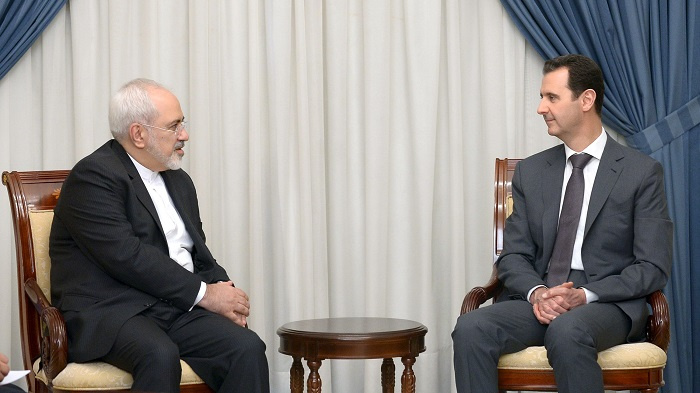Iran’s Dilemma in Syria

In his latest press conference, Iran's President Hassan Rouhani has warned against Washington’s dangerous actions in Syria that can easily spiral out of control, while simultaneously stating that certain changes in Syria were necessary. The latter is the clearest indication yet that Tehran is wary of being burnt by its association with a government accused of using chemical weapons against the civilian population, even though there is a fairly strong conviction that the Syrian government's denial is plausible since, for one thing, they were winning the war and had no need to resort to this kind of attack that was sure to backfire against them in the international community.
For his part, Syrian President Bashar al-Assad in his telephone conversation with Rouhani has reiterated his denial of any complicity in last week's deadly attack that killed several dozens and injured over 500, many women and children included. Iran concurs with the UN Special Envoy, Steffan De Mistura, that such attacks are criminal and whoever is responsible ought to be held accountable. President Rouhani has echoed Russia's call, ignored at UN Security Council last week, for an impartial fact-finding. The US, on the other hand, proving trigger-happy, is pointing at confidential evidence implicating Damascus, and asking the world community to simply trust and have blind faith in US’ allegations -- that have resulted in the firing of 59 Tomahawk missiles at a Syrian air base, followed by hawkish US statements on regime change in Syria.
Having successfully mobilized a bulk of the world's public opinion behind the missile attack on Syria, the US and its vast conglomerate of propaganda machine is put in extra gear to pin the blame on Assad and to stigmatize him so hard that he would be unsalvageable. US Secretary of State Rex Tillerson has been dispatched to Moscow to turn Russia from a "source of problem into a solution," although it is unclear what Washington has in mind, in light of Syria's geostrategic importance to Russia. What is clear, however, is that the inhuman gas attack has put Moscow and Tehran on the defensive and may also fragment the Shiite bloc, in light of the call by Iraq's Shiite strongman Sadr on Bashar to step down.
From Tehran's point of view, Assad may soon become a liability, resembling a sinking ship that might swallow its supporters as well. This explains why the Iranian foreign ministry's initial reaction was to condemn the gas attack and did not second Damascus's denial of culpability. Lest we forget, the UN-based investigations in 2014 and 2015 concluded on a couple of occasions that Damascus had used chemical weapons, even though as of October, 2013, UN had verified the complete destruction of Assad's declared chemical weapons. So, the question is, what to do if the fact-finding mission under way concludes the responsibility of the Assad forces? This is a distinct possibility that is rendered somewhat improbable due to the following:
(a) lack of motivation on the part of winning Assad forces;
(b) past uses of chemical weapons, particularly at delicate times in the peace process;
(c) peculiar objection of Washington to Russia's call at Security Council for a fact-finding mission to Syria, followed by US’ unilateral attack, which has been nuanced by Washington as a "signal" to Iran and North Korea.
(d) the immediate expansion of the missile attack to a U-turn in US policy now aimed at regime change in Syria and ending Iran's influence, tantamount to de-prioritizing the fight against ISIS.
(e) strong evidence that US-backed Israel seeks an endless quagmire in Syria, rather than a successful anti-ISIS campaign benefiting the current Syrian government and its allies.
In light of the above-said, Iran is caught between the rock of denouncing chemical weapons and its culprits and the hard place of finding a suitable position that could safeguard against both US’ threat and the "guilt by association" stemming from its close alliance with Syria. By calling for "certain reforms" in Syria, Rouhani has signaled that it might be willing to think the unthinkable, that is, a Syria without Bashar al-Assad. But then again, can Iran's strategic assets in Syria, and Lebanon, really survive a change of regime in Syria? There are too many uncertainties regarding the latter, thus making Rouhani's statement on reform in Syria a bit of political gamble, stemming from Iran's own national security concerns. For sure, there needs to be a political evolution in Syria and some form of "political transition," but one that would guarantee that Libya's post-Ghaddafi descent into chaos is not repeated and Syria is not condemned to permanent fragmentation.
Iran's Supreme Leader, on the other hand, has rightly warned that Iran will not be cowered by the US threats, blaming the US for creating the ISIS and now using the pretext of chemical attack to support them by attacking the Syrian government in violation of international law. Indeed, the right approach to US’ hard-power threat signal is to convince the other side that their signals are not having the desired effects, otherwise it will be an invitation to more and more US’ military flexing. Iran's hard power response in bolstering its national defense is, indeed, the only long-term remedy, coupled by smart regional diplomacy.

